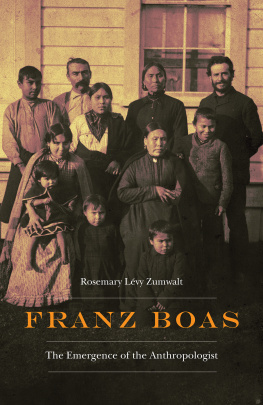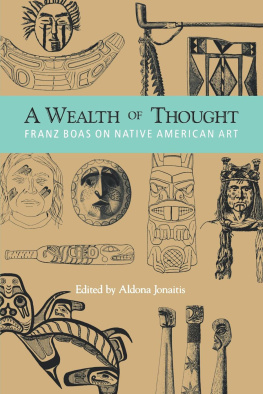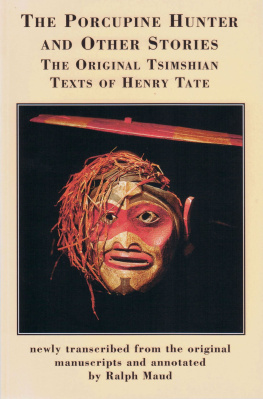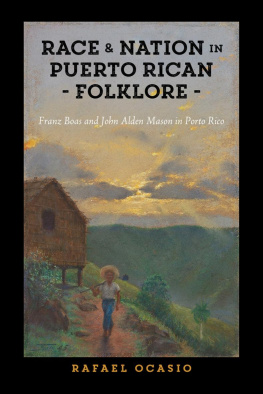Germany - Franz Boas: the emergence of the anthropologist
Here you can read online Germany - Franz Boas: the emergence of the anthropologist full text of the book (entire story) in english for free. Download pdf and epub, get meaning, cover and reviews about this ebook. City: Lincoln, year: 2019, publisher: University of Nebraska Press, genre: Home and family. Description of the work, (preface) as well as reviews are available. Best literature library LitArk.com created for fans of good reading and offers a wide selection of genres:
Romance novel
Science fiction
Adventure
Detective
Science
History
Home and family
Prose
Art
Politics
Computer
Non-fiction
Religion
Business
Children
Humor
Choose a favorite category and find really read worthwhile books. Enjoy immersion in the world of imagination, feel the emotions of the characters or learn something new for yourself, make an fascinating discovery.
- Book:Franz Boas: the emergence of the anthropologist
- Author:
- Publisher:University of Nebraska Press
- Genre:
- Year:2019
- City:Lincoln
- Rating:4 / 5
- Favourites:Add to favourites
- Your mark:
- 80
- 1
- 2
- 3
- 4
- 5
Franz Boas: the emergence of the anthropologist: summary, description and annotation
We offer to read an annotation, description, summary or preface (depends on what the author of the book "Franz Boas: the emergence of the anthropologist" wrote himself). If you haven't found the necessary information about the book — write in the comments, we will try to find it.
Germany: author's other books
Who wrote Franz Boas: the emergence of the anthropologist? Find out the surname, the name of the author of the book and a list of all author's works by series.
Franz Boas: the emergence of the anthropologist — read online for free the complete book (whole text) full work
Below is the text of the book, divided by pages. System saving the place of the last page read, allows you to conveniently read the book "Franz Boas: the emergence of the anthropologist" online for free, without having to search again every time where you left off. Put a bookmark, and you can go to the page where you finished reading at any time.
Font size:
Interval:
Bookmark:
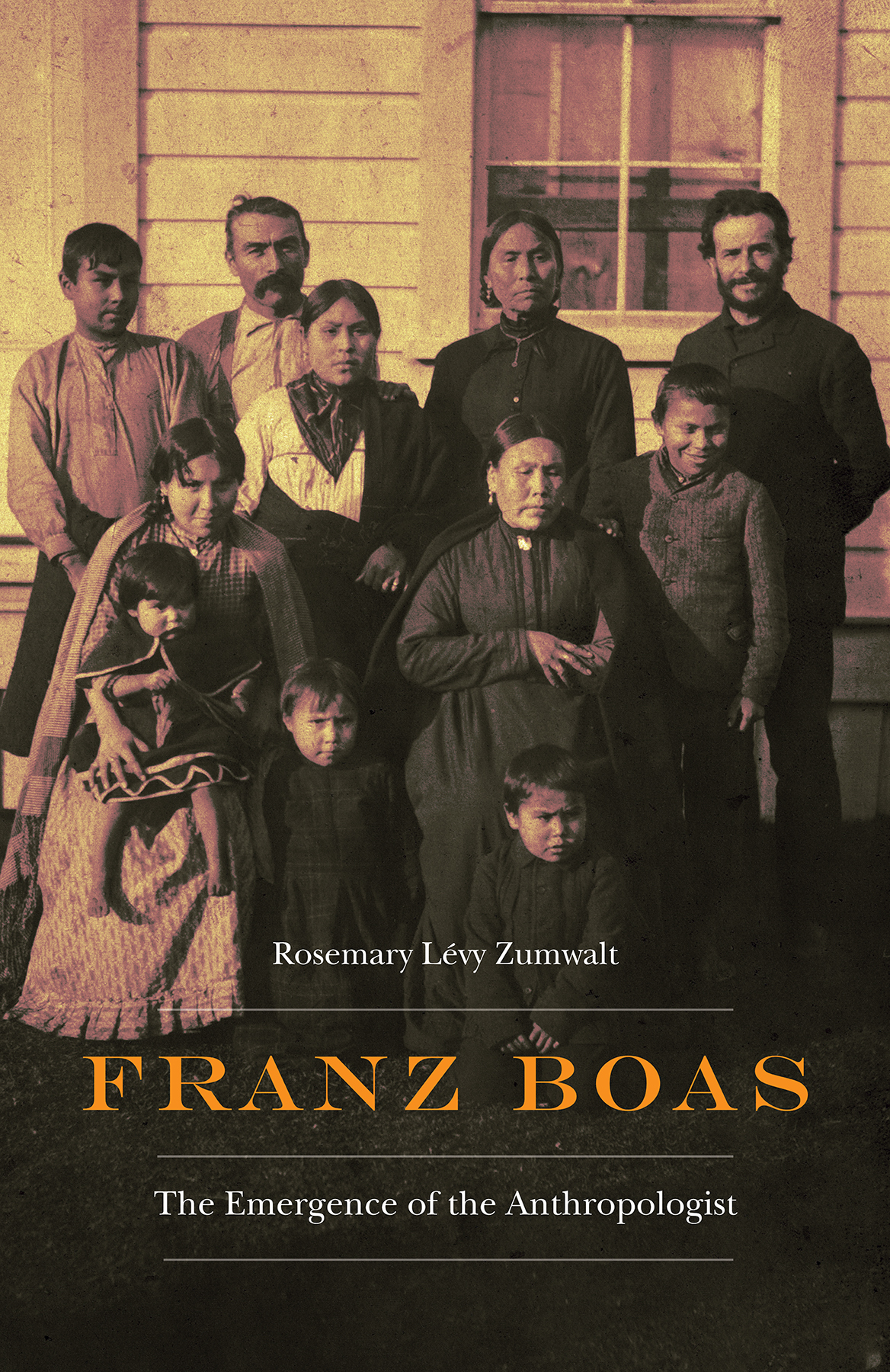
Zumwalt leads us to know Franz Boas as never before, and we should be grateful. She gives us his engrossing love and life story across vast continents. She lets us walk with him into the classroom as well as into his home. She marvelously gives him voice, so we can discern his message for our time as well as in his.
Simon J. Bronner, author of American Folklore Studies: An Intellectual History
Rosemary Zumwalt has written a biography of Franz Boas truly for the twenty-first century. Going beyond George Stocking and Douglas Cole, she focuses here on Boass early life in its historical and cultural setting. We eagerly await her second and concluding volume.
Ira Jacknis, Phoebe A. Hearst Museum of Anthropology, University of California, Berkeley
Critical Studies in the History of Anthropology
Series Editors
Regna Darnell
Stephen O. Murray
Rosemary Lvy Zumwalt
University of Nebraska Press | Lincoln
2019 by the Board of Regents of the University of Nebraska.
Cover designed by University of Nebraska Press; cover image is from the interior.
Author photo Barbara McGuiness.
All rights reserved.
Library of Congress Cataloging-in-Publication Data
Names: Zumwalt, Rosemary Lvy, 1944, author.
Title: Franz Boas: the emergence of the anthropologist / Rosemary Lvy Zumwalt.
Description: Lincoln: University of Nebraska Press, [2019] | Series: Critical Studies in the History of Anthropology | Includes bibliographical references and index.
Identifiers: LCCN 2019004038
ISBN 9781496215543 (cloth: alk. paper)
ISBN 9781496217455 (epub)
ISBN 9781496217462 (mobi)
ISBN 9781496217479 (pdf)
Subjects: LCSH : Boas, Franz, 18581942. | AnthropologistsGermanyBiography. | AnthropologistsUnited
StatesBiography. | Racism in anthropology.
Classification: LCC GN 21. B 6 Z 86 2019 | DDC 301dc23
LC record available at https://lccn.loc.gov/2019004038
The publisher does not have any control over and does not assume any responsibility for author or third-party websites or their content.
Dedicated to Ludger Mller-Wille
Scholar of the Arctic and of Franz Boas
Friend and colleague
Regna Darnell and Stephen O. Murray
Although there have been many biographies of Franz Boas over the years since his death in 1942, the breadth of his six-plus decade career has eluded the capacity of any single biographer to capture its complexity or to fully assess his contributions across academic disciplines, the professionalization of American science in universities, and his public activism. Previous efforts have ranged from uncritically laudatory to unmitigatedly disparaging or have focused on limited parts of his oeuvre such as race and diversity, political activism, disciplinary contributions to anthropology, linguistics, folklore, education, and Native American Studies.
Rosemary Lvy Zumwalt combines a conversational and readable style with a systematic and comprehensive revisionist account of Boas and Boas scholarship. Familiarity with Boass diverse disciplines and the employment of a professional translator for the German that was his first language allows her to unpack his evolving theories and methods for contemporary audiences in a range as diverse as Boass own.
The first work, The Emergence of the Anthropologist, begins with Boass family background and the Germany of the times in which he was born. Like Tristram Shandy, his birth is not the beginning of the story. Zumwalt, like Douglas Cole before her, chose a natural cutoff date of 1906, when Boas left the American Museum of Natural History to concentrate on developing anthropology as an academic discipline and training a cadre of students who shared his vision for Americanist anthropology. In terms of his professional achievements to this point, documentation is relatively straightforward, in that Boass career remained largely within the bounds of anthropology as understood in the late nineteenth and early twentieth centuries. But to Boas himself, it was far from straightforward.
The story crisscrosses continents, national traditions, and disciplinary actors and includes multiple disappointments and dead ends. Zumwalt has searched out and incorporated Boas materials from archives throughout the United States as well as from his papers at the American Philosophical Society, often relying on her own translations. Much of this material is previously unknown in English-language sources. It fleshes out Boass early education and the fluid character of the disciplines he explored before opting for anthropology as his primary professional identity. The path from psychophysics, physical geography, cultural geography, and physical anthropology to cultural anthropology and ethnography emerges as a gradual one, each new set of interests retaining insights and methods from his prior endeavors. Boas was not alone in this fluidity; his mentors also pursued research questions and developed methodologies not clearly bounded by disciplinary labels. The social sciences were not as discrete as those of their descendants familiar to us today. Boas adopted important parts of his mature position from each of these directions. Throughout his career, he would continue to incorporate methods and perspectives from other disciplines (e.g., applying Indo-European linguistic techniques to unwritten Indigenous languages of the Americas).
Zumwalts treatment of Boass cartography and ethnology among the Eskimo (now called Inuit in Canada) of Baffin Island is particularly detailed and revealing, drawing extensively on the geographic researches of Ludger Mller-Wille. The transition to the Northwest Coast and the interaction of the regions cultures and languages would occupy Boas for the rest of his life. Zumwalt chronicles his anxiety at separation from his family to establish a baseline that fieldwork collaborators and students could pursue under his direction from afar.
Later recollections of Boas by later generations of colleagues, students, and his own children and grandchildren inevitably focus on the mature Boas, on the often more self-confident, aloof, and formal persona of the public intellectual at the forefront of his discipline. This volume captures the uncertainties and vicissitudes of his earlier career, in which later successes were only ambitious dreams. Zumwalt interweaves the professional and the personal, revealing the love story of Boas and Marie as well as the conflicts of loyalty Boas suffered balancing his family in America against often conflicting loyalties to his parents, sisters, and other family, as well as to colleagues and mentors remaining in Germany. Zumwalt uses his own words to highlight the poignancy of his struggles in this early period: his difficulties in learning English, precarious employment, and failure to realize his grand ambitions quickly. Readers are led to consider the period in his life before the end of the story was known. We see the young Boas from his own point of view.
Shaping Anthropology and Working for Social Justice, the forthcoming second work of this biography, turns to the more mature and decisive Boas, professionalizing Americanist anthropology according to his view of its proper scope and expanding his influence through the students he trained at Columbia. Zumwalt emphasizes the continuity between the early idealism of Europes 1848 failed revolutions that Boas acquired from his mother and took with him into professional practice as well as in his personal life. Tendrils extending beyond his home discipline increasingly led Boas out of the ivory tower: his political commitments, played out across continents, and his passionate belief in anthropology as holding a key to solving the problems of living in challenging times. Though his emphasis moved from antiracism in America to resistance to Nazi oppression, Zumwalt argues that Boas remained rooted throughout in the elusive values of the early years chronicled in the present work that sets the stage.
Next pageFont size:
Interval:
Bookmark:
Similar books «Franz Boas: the emergence of the anthropologist»
Look at similar books to Franz Boas: the emergence of the anthropologist. We have selected literature similar in name and meaning in the hope of providing readers with more options to find new, interesting, not yet read works.
Discussion, reviews of the book Franz Boas: the emergence of the anthropologist and just readers' own opinions. Leave your comments, write what you think about the work, its meaning or the main characters. Specify what exactly you liked and what you didn't like, and why you think so.

